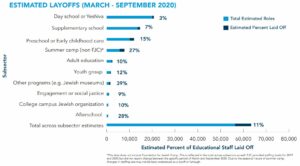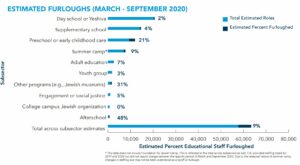CASJE Now Conducting National Jewish Educator Census
June 25th, 2021
A second round of the National Jewish Educator Census conducted by CASJE at George Washington University is an opportunity to learn more about the size of and changes to the Jewish education workforce in 2021, collect more demographic data about Jewish educators, and refine the research team’s methods and estimates.
Results from the first year of the census provides an estimate of the number of Jewish educators across multiple sectors of American Jewish life, changes to the workforce due to Covid 19, and other information that will help leaders and stakeholders in Jewish education understand the state of the field as they prepare for a post-Covid world.
The CASJE Census is the first extensive data collection of its kind, and we took it out of the ivy tower into the real world. We created enthusiasm and recruited participation during a very strenuous time for everyone. Even during the pandemic, we partnered with many Jewish educator sectors and affiliations who understood the importance of collecting these data. Now, we know more about the size of the field and the changes that occurred during the pandemic. We look forward to learning more in the 2021 round of the CASJE Census and using the data to inform the field. – Dr. Ariela Greenberg, founder of The Greenberg Team and lead researcher for the Census
CASJE (Collaborative for Applied Studies in Jewish Education) is an evolving community of researchers, practitioners, and philanthropic leaders dedicated to improving the quality of knowledge that can be used to guide the work of Jewish Education. The Census is part of the CASJE Career Trajectories Study, a multi-year, national research effort addressing the recruitment, retention, and development of educators working in Jewish settings in North America. Ensuring that a strong and high-quality pipeline of educators exists is one of CASJE’s primary objectives.
Census Year 1 Key Findings:
In the early months of the Covid pandemic (March – September 2020) the overall size of the Jewish education workforce shrank. In this period, layoffs affected up to 11% of all roles; furloughs affected up to 9% of all roles. We estimate that the largest numbers of layoffs and furloughs were in camping and the Jewish early childhood workforce.


The success of Jewish educational programs depends, in large part, on the expertise, talent, and professionalism of the Jewish education workforce. Our field needs to know who Jewish educators are and what they need to succeed in their work. Then, organizations will be able to design training and support programs to help educators effectively and meaningfully engage with their learners. – Dr. Arielle Levites, managing director of CASJE.
CASJE’s multi-year research project examining the career trajectories of Jewish educators is generously funded by the William Davidson Foundation and Jim Joseph Foundation.